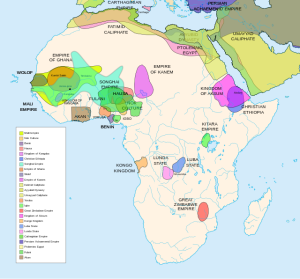The History of Africa to 1500
More than eleven million square miles in size, Africa is Earth’s second-largest continent and home to a huge diversity of geographies and climates. Its environments range from arid desertscapes with sand dunes hundreds of feet high to lush tropical rainforests blanketed by impenetrably dense foliage. Its peoples have adapted to these environments over millennia, and their achievements were great, but extreme climates wreak havoc on the historical record. Ancient Africa was nevertheless a marvelous mosaic of unique civilizations, and the more historians work at uncovering their pasts, the clearer our picture will be of their accomplishments and contributions to world history.
The Cradle of Humanity
The human story begins in Africa, where the earliest humans, Homo sapiens, emerged around 300,000 years ago in the region of modern-day Ethiopia. From this birthplace, humans migrated to various parts of the continent, developing complex societies, cultures, and civilizations.
Ancient Civilizations
Around 3100 BCE, ancient Egypt rose along the Nile River, renowned for its pyramids, mummies, and hieroglyphics. Meanwhile, the Nubian Kingdom of Kush flourished in present-day Sudan, and the Axumite Empire dominated the Horn of Africa.
Medieval Kingdoms
As the centuries passed, powerful kingdoms emerged in West Africa, such as the Ghana Empire (300-1200 CE), Mali Empire (1230-1465 CE), and Songhai Empire (1464-1591 CE). These kingdoms controlled vast trade networks, harnessed the riches of the Sahara Desert, and fostered Islamic scholarship.
Southern Africa
In Southern Africa, the Bantu people migrated from central Africa, bringing iron working and agriculture to the region. The Kingdom of Mapungubwe (1075-1220 CE) and the Great Zimbabwe (1100-1450 CE) rose to prominence, showcasing sophisticated architecture and gold trade.
Africa’s Rich Legacy
By 1500 CE, Africa had already witnessed the rise and fall of numerous civilizations, leaving behind a rich legacy of cultural, scientific, and artistic achievements. This history laid the foundation for the dynamic and diverse continent we know today.

Source: Wikimedia Commons
